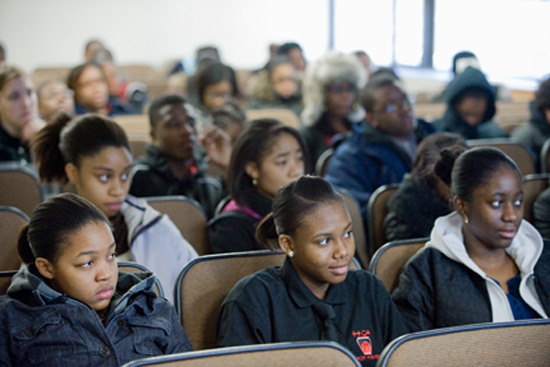Welcome to the School of Public Health
Local high school students get a sense of the profession, and its goals

Although Bria Belim is still in high school, she says she’s sure of her career plans: she wants to be a medical examiner.
“Anywhere I go, they’ll need a medical examiner,” Belim says, and she’s already begun to gather experience in the field. “I had an internship last summer at Children’s Hospital transporting blood supplies to different departments,” she says. “One time I even got to carry a colon in a cooler, and I got to see a bone marrow transplant.”
Belim attends Boston’s Edward M. Kennedy Academy for Health Careers, a charter school for students who want to pursue careers in the health sciences. The school helped her find the internship at Children’s Hospital, and in a few months she will intern at a funeral home.

Last week, Belim and her classmates headed to the Medical Campus to learn about careers in public health. The School of Public Health invited more than 100 students from four Boston high schools to the second annual daylong event, New Faces in Public Health, which introduced them to the basic goals of the field.
Community Academy of Science and Health, in Hyde Park, Madison Park Technical Vocational High School Health and Human Services Academy, and East Boston High School Health and Human Service Pathway also sent students for the day.
“When I was your age, I had no idea what public health was,” said Robert Meenan, dean of SPH, as he welcomed the group. He framed the profession in proactive terms. “Prevention is huge,” he said. “Think about it like this: medical doctors try to make people better after they become sick, but public health can prevent people from getting sick.”
Anna Steenrod (SPH’10) interns with the Boston Public Health Commission’s Flu Commission Team and is a member of the SPH Public Health Alliance for Minorities. She presented her semester-long work on H1N1 using an interactive quiz. “I feel like I can relate to these students because it wasn’t such a long time ago that I was in high school,” Steenrod said. “It really means a lot when you get to them.”
A highlight of the day for Belim was seeing presentations of student practicums. Each of the 66 SPH students spent at least 150 hours in the field, and they presented their projects at the event. Topics ranged from preventing lead poisoning in Boston children to managing India’s women health workers. Faculty members judged the SPH students on their presentations while the high schoolers completed a scavenger hunt, searching for clues from each of the presentations.
As Belim was working on the scavenger hunt, she also was hunting for intriguing projects. She found Megan Aleardi (SPH’10), who worked with the Massachusetts Department of Public Health in the Office of HIV and AIDS. Aleardi evaluated a report distributed to HIV and AIDS patients, intended to assess their independence.
“It’s time to change the whole model,” Aleardi told Belim. “AIDS research once had tons of funding, and that sufficiently supported patients, because they were dying young. Now, AIDS patients are living longer and the money is running out.”

Belim thanked Aleardi and looked at a few more posters before stopping to talk with Kira Wilke Taj (SPH’10), who interned with the Young Parent Initiative. The project works with parents at home and in a local community centers to provide health education, linking new families to community services.
“We’re here to help,” Wilke Taj said, explaining that her internship took her to clinics and schools to help young parents adjust to new demands.
Kristen Driscoll (SED’09), one of Belim’s teachers, earned a master’s degree in education from BU last year. She works with students in career exploration and community service, and said that for a student like Belim, seeing a range of presentations and perspectives was most valuable.
“The students are learning,” Driscoll said. “It takes one experience to spark their interest. It’s important to expose kids to higher education. I think before they came here, they didn’t know what public health was, and now they have another career option.”
The day didn’t change Belim’s plan to become a medical examiner. But the experience broadened her horizons, and she made a connection between what she learned and a recent church trip to Bermuda.
“We drove around the whole island and saw only one health clinic,” she recalled. “A lot of people on the island have to come to Boston for surgeries. I think that’s the first time I really realized what public health really means.”
Amy Laskowski can be reached at amlaskow@bu.edu.

Comments & Discussion
Boston University moderates comments to facilitate an informed, substantive, civil conversation. Abusive, profane, self-promotional, misleading, incoherent or off-topic comments will be rejected. Moderators are staffed during regular business hours (EST) and can only accept comments written in English. Statistics or facts must include a citation or a link to the citation.